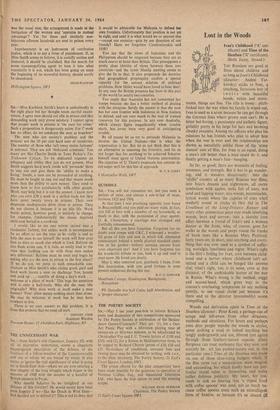Stn,—Miss Kathleen Smith's heart is undoubtedly in the right place
but her thought needs careful exami- nation. I agree men should not idle in prison and that demanding work may prove salutary. I cannot agree that proper work in prisons is 'the cure for crime.' Such a proposition is dangerously naive. For if work has no effect, do we condemn the men as hopeless?
The men who are society's problem and the prisons' are the 20 per cent hard core of recidivists. The number of those who 'salt away stolen fortunes' is minimal. They are not 'dedicated criminals.' Too many are like Charlie Smith in Tony Parker's The ,Unknown Citizen. To be dedicated requires an adequacy and ability they just do not pcissess. Miss Smith suggests hard work inside will 'persuade' them to 'stay out and give them the 'ability to make a living.' Inside, a man can, be persuaded of anything. He must be taught to stay out and that means much More than the ability to earn money. They need to know how to live satisfactorily with other people. Work may help but it is not the answer. I know men who can earn £20 a week in a skilled trade but they have spent twenty years in prisons. Their own desperate inadequacies drive them to prison. They do not choose it because it is an idle life. Work inside prison, however good,, is unlikely to change, for example, fundamentally the classic deprived child now buried in a recidivist.
I would like to see one prison turned into a residential factory, but unless work is accompanied by an effort to see the man as he really is and to help the man to see himself the work will flow over him as does so much else which is tried. Reform on one flank alone can, if it fails, so easily lead to the view that 'nothing you do with these men makes any difference.' Reform must be total and begin by asking why are the men in prison in the first place? If we do not, we jump to such remarkable con- clusions as Miss Smith's who claims good, paid and hard work leaves a man on discharge 'free, honest and paid up . .. capable of doing a day's work . . . welcome at a place of work.' This begs the questions and is only a half-truth. Why did the man idle originally? Why does work in itself make a man honest? 'Free' often means nothing more than alone. He may be welcome at work but he may have nowhere to live.
There is no easy answer to this problem. It is from this premise that we must all start.
• TIMOTHY COOK
Assistant Warden Norman House, 15 Aberdeen Park, Highbury, N5


































 Previous page
Previous page